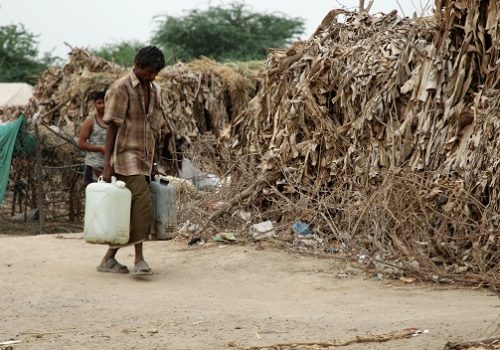President-elect Joe Biden can help end the war in Yemen
On November 20, the Secretary General of the United Nations (UN), Antonio Guterres, warned that war-torn Yemen was on the brink of experiencing “the worst famine the world has seen for decades” and that millions of lives may be lost in the absence of immediate action.
The announcement came after the UN’s early warning mechanism concluded that the three indicators of famine—food insecurity, income deprivation, and acute malnutrition—were evident in Yemen, deriving from renewed violence after six years of conflict, a deepening of the economic crisis and currency collapse, and the coronavirus pandemic. If this trajectory continues, the number of highly food insecure people in Yemen would jump from 13.5 million to about 17 million—almost two-thirds of the 29 million population.
The growing number of Yemenis who depend on international relief assistance are impacted by the funding shortfalls to UN agencies. The failure to sustain enough external support to stabilize the Yemeni rial has exacerbated the economic woes. The Houthis and other warlords continue to impede the lifesaving work of UN agencies. If major donors fail to contribute to UN humanitarian relief operations—which has been the case so far this year—the world’s worst humanitarian crisis will, unfortunately, cross a new threshold into famine or worse.
Yemen’s war economy penetrates deeply into all aspects of Yemeni life, such as the scarcity of food commodities and other essential supplies, like medicine and oil derivatives. This has been exacerbated due to the Yemeni government’s failure to provide essential services to the population in various regions, and by the Houthis who are demanding payments from impoverished people in areas under their control, as a so-called war-effort tax.
The division and duplication of Yemeni state institutions—specifically banking institutions—are also a great driver of humanitarian suffering. Having two central banks dominated by war politics has gravely affected the national currency’s value. The rapid currency depreciation of the Yemeni rial against the US dollar since 2015 has caused millions of families—more than 80 percent of the population—to drop below the poverty line of $2 per day. Thus, the Yemeni government cannot consistently pay civil servants’ salaries in areas under its control, mirroring the Houthis, who continue to refuse to pay salaries for the fifth year in a row.
The Biden campaign pledges for Yemen
Through his campaign promises, President-elect Joe Biden promised Yemeni-Americans two things. First, to abolish the unconstitutional Travel Ban, which impacted Muslim-majority countries and the families of the Yemeni-American community. Second, to “end US support for Saudi Arabia’s war in Yemen.” Biden should go one step further and pledge to end the war itself.
By March 2021, the Biden administration will have spent its first one hundred days in office. At the same time, the war in Yemen will have entered its seventh year, continuing the effects of the world’s worst man-made humanitarian crisis.
If Biden commits to putting an end to the war in Yemen, he can prevent Yemen from falling into the hands of warlords and Iran’s proxy network—namely the Houthis and Lebanese Hezbollah—as well as other terrorist groups like al-Qaeda in the Arabian Peninsula (AQAP) and the Islamic State of Iraq and al-Sham (ISIS).
On a very cautious note, I would like to express my understanding that the new administration’s priorities in international affairs will not have Yemen at the top of its list during its first one hundred days in office. However, I still believe that human suffering, human rights, and freedom, which embody the fundamental values and principles of American democracy, will prevail.
I disagree with the differing opinions of researchers and analysts concluding that the new administration approach will be a total rejection of President Donald Trump’s approach to the region and an extension of Barack Obama’s legacy. I, instead, believe that Biden’s approach will be more pragmatic—addressing the root causes of the regional malady and lack of coexistence. I remain hopeful that his approach will evolve with wisdom and cautiousness, working with historical regional allies and pacifying the volatile Middle East by returning to core American democratic values in international relations.
Of course, there is no way Biden can secure progress towards peace in Yemen through diplomatic regional leverage alone, when parties on the ground still insist on refusing to advance peace or relief to millions of impoverished Yemenis battling famine and infectious diseases.
Options for peace
So, what are Biden’s options for stopping the war in Yemen? In line with the new administration’s commitments to strengthening multilateralism, President-elect Biden will need to encourage the UN Security Council (UNSC) to speak in one voice on the Yemeni tragedy. This is particularly important after almost one year of successful efforts by the Special Envoy of the Secretary General for Yemen, Martin Griffiths, to reach a consensus between the Yemeni government and the Houthi rebels on the Joint Declaration. A compromised plan, the Joint Declaration may lead to a nationwide ceasefire, economic and humanitarian measures, the resumption of political consultations on security, and a political settlement to reach a sustainable and implementable solution establishing a national unity government.
There is an urgent need for both the Yemeni government and the Houthis to conclude the negotiation of the Joint Declaration. As time goes by and Yemen’s conflict continues, the solutions become increasingly difficult, as the parties and actors in the conflict fragment and multiply and state institutions erode. The war economy eventually entirely replaces the national economy, creating more lucrative and attractive incentives for those who benefit from continued fighting.
If the UN-led process proves to be unsuccessful, another option is to reintroduce former Secretary of State John Kerry’s peace plan of 2016. The Kerry Plan was drafted under the Barack Obama administration and was unfortunately put forward in the last months before Trump took office. Despite President Trump’s initial urgent call to end the war in Yemen during his first months in the Oval Office, internal dynamics and compromises by the Trump administration caused Yemen’s war to be forgotten and treated with indifference.
The incoming Biden administration can also revisit the Hudaydah Agreement of 2018, which has the necessary endorsement of the UNSC and all the UN interoperability on the ground through the United Nations Mission to support the Hudaydah Agreement (UNMHA). Unfortunately, it was never given enough effort to move forward because of the parties involved—particularly the Houthis, who failed to understand its pilot project character. To this day, the Houthis continue to show a lack of interest in peace, as demonstrated by their fighting on all battlefronts inside Yemen and their attacks on neighboring countries.
As I end my recommendations, I urge the incoming Biden administration to see Yemen as a friendly nation in need and to view Yemen as a country—as part of American obligations as a permanent member of the UNSC to safeguard peace and stability in the world—and not only through the perspectives and interests of other nations in the region and beyond.
Finally, should we fail to stop this carnage and support the momentum that the new administration brings with it, with time, we will come to lament the loss of millions of Yemeni lives and the total destruction of the beautiful land of Arabia Felix—the cradle of human civilization.
Ambassador Khaled H. Alyemany is the former Foreign Minister of Yemen.
Image: A worker reacts as he stands on the wreckage of a vehicle oil and tires store hit by Saudi-led air strikes in Sanaa, Yemen July 2, 2020. REUTERS/Khaled Abdullah


